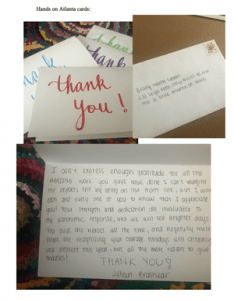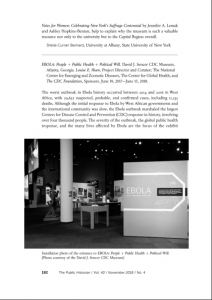
Teaching a service-learning course in Fall 2020 during the COVID-19 pandemic seemed like an impossible task. However, the opportunity for students to reflect on what they did with and for communities during this extraordinary time is one that I could not pass up. I taught Sociology of Health and Medicine with a focus on the health inequities associated with COVID-19. The students who decided to stay in the course and take part of the service-learning challenge were creative and imaginative of how they could work with communities safely. Many students conducted their service learning virtually by doing various types of volunteer work, such as being an academic tutor through the organization Mind Bubble, writing thank-you letters to Atlanta healthcare providers with Hands-on Atlanta, developing on-line music lessons for patrons of the Covenant House, creating videos by reading children’s books for the United Way of Greater Atlanta Online Storytime, providing virtual assistance and disaster relief to people all over the U.S. with the American Red Cross, making masks for Grady Hospital Frontline Workers, building tool boxes for Habitat for Humanity, or answering calls for a COVID-19 Hotline with the Good Samaritan Clinic. Other students worked with communities in person using safety precautions to prevent the spread of COVID-19, such as delivering meals through Open Hand Atlanta, planting trees with Trees Atlanta, packaging backpack kits with the Empty Stocking Fund, screening blood donors during blood drives with the American Red Cross, or working in various food pantries across Atlanta to address the increased risk of food insecurity during this time. The students engaged in these service-learning experiences (and others) and connected their learning with the course materials that focused on fundamental causes of health and illness. They also considered how their service learning aligned with the U.N. Sustainable Development Goals. From education and access to food to personalized assistance and protective masks, all things lead to issues of health. Indeed, shifts were made, but not surprisingly, Georgia Tech students were up for the challenge.
